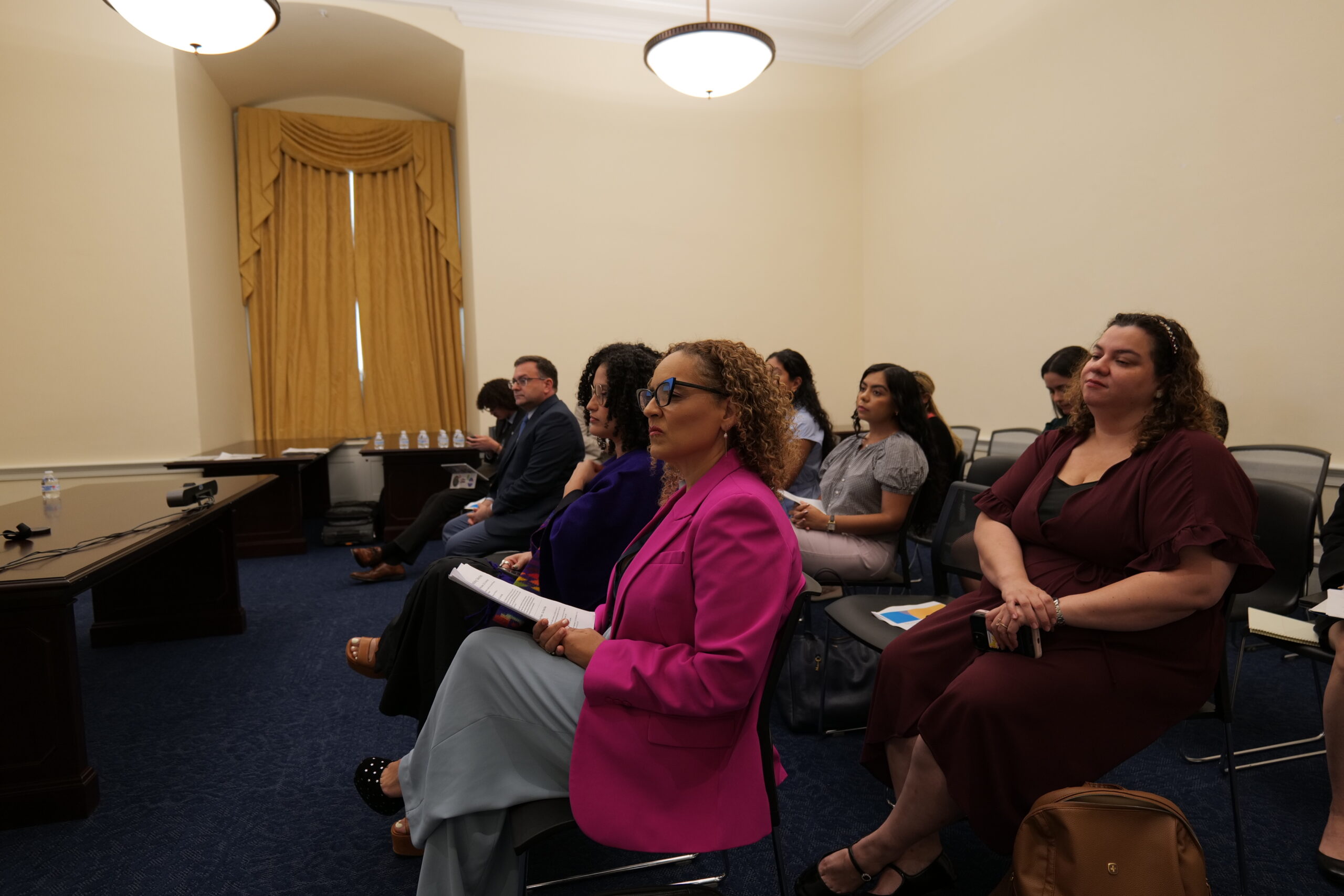
From challenge to partnership: Latino community organizations lead a conversation on sustainable funding models
On July 23, 2025, in Washington, D.C., Congresswoman Nydia M. Velázquez and Grupo Nexos brought together community leaders and policy experts to highlight a growing crisis that threatens the heart of Latino communities nationwide. The congressional briefing, “Serving Latino Communities in Uncertain Times: Nonprofit Responses to Government Funding Challenges”, revealed sobering data about how changes in federal funding priorities are putting essential community services at risk.
The numbers tell a stark story
The research presented by the Urban Institute painted a picture of widespread vulnerability across the nonprofit sector serving Latino communities. Nationwide, nonprofits received over $267 billion in government grants in 2021—nearly three times the amount of foundation giving. But here’s the critical finding: nearly 70% of these organizations cannot cover their expenses without this government funding.
The situation becomes even more alarming when we look at specific regions. Puerto Rico faces the most severe crisis, with 84.2% of government-funded nonprofits unable to sustain operations without government support. In New York, 8,743 nonprofits received $29.7 billion in government grants, with 69.5% of them at financial risk if funding were to disappear. Florida shows similar vulnerability, with 69.9% of its 3,981 nonprofits facing potential crisis.
Perhaps most telling is the clear pattern that emerged from the data: predominantly Latino congressional districts show significantly higher risk rates—73% in New York and 72.5% in Florida—compared to other districts.
Community leaders speak out
Dr. Marizaida Sánchez-Cesáreo, CEO of Grupo Nexos, emphasized the sector’s readiness to be part of the solution: “The nonprofit sector serving Latino communities is eager to be an active partner in developing sustainable solutions across all levels of government and with philanthropic partners. We bring deep community knowledge, proven track records of innovation, and a commitment to contextualized evidence-based practice.”
She continued, “We understand that the federal funding landscape is evolving. We’re asking for thoughtful partnership in building something better—funding models that leverage federal resources alongside state, local, and private investments to create sustainable, effective systems responsive to community needs.”
Pablo Blank, Director of Immigrant Integration at CASA, shared the real-world consequences of funding cuts: “When non-profit organizations are trying to innovate, finding ways to do better our jobs and how to better serve our populations, we receive these cuts and then everything is set back… not only the organization and the staff, but all the community suffers.”
Julietta Lopez, VP for Federal Advocacy & Network Mobilization at Hispanic Federation, outlined the path forward: “Working in community with partners is the most important thing moving forward. The national Latino leaders have been meeting to think of ways to do this, for example: create a response fund to support organizations, identify the expertise that we need, and coordinate so that we can all lead in the areas that we are best equipped to manage.”
Breaking down the crisis by region
Puerto Rico: The epicenter of risk
Puerto Rico faces the most dire situation, with 84.2% of nonprofits at financial risk without government grants. The median deficit without government funding reaches 30.9%—the worst in the entire study. Some metro areas show even more extreme vulnerability, with Guayama at 100% risk and Mayagüez at 90.5%.
New York: Bronx leading in vulnerability
Bronx County shows the highest vulnerability at 84.2%, correlating with its 55% Latino population. Congressional Districts 14 and 15 show particularly high risk rates of 86% and 82.3% respectively. Across predominantly Latino congressional districts in New York, $8.4 billion in government grants flow to communities where 73% of nonprofits face financial risk.
Florida: A similar pattern emerges
The Miami-Fort Lauderdale-West Palm Beach metro area, with its 46% Latino population, shows 73.2% of nonprofits at risk. Congressional Districts 26, 27, and 28—which are 74%, 73%, and 72% Latino, respectively—show risk rates of 75.5%, 76.8%, and 77.3%.
Understanding the broader context
Laura Tomasko, Senior Policy Manager at the Urban Institute, put the findings in perspective: “The majority of 990 filers that report receiving government grants nationwide are at risk of running a deficit without their government grants. Puerto Rico has the largest share of these 990 filers at risk, and the typical Puerto Rican 990 filer has the highest deficit without its government grants at 30.9%.”
She was careful to clarify what the data means: “Now this does not mean that a nonprofit would close down, it just means they would have to figure out how to make that money up, and of course, there are a lot of different ways that a nonprofit can go about doing that.”
The research revealed that certain sectors face particular vulnerability:
- Human services organizations: 71% at risk
- Health organizations: 70% at risk
- Education organizations: 68% at risk
The nonprofit sector’s importance extends far beyond community services. These organizations employ approximately 12.7 million people, accounting for around 10% of all private-sector employees. Combined, the nonprofit sector represents 5.2% of GDP, totaling $1.4 trillion in 2023. Two out of three nonprofits report receiving government grants, making this funding essential to the broader economy.
The clear pattern: Where Latinos live, risk increases
One of the most significant findings from the briefing was the consistent correlation between Latino population concentration and nonprofit financial vulnerability. As the percentage of the Latino population increases in a geographic area, so does the percentage of nonprofits at financial risk if government funding is eliminated. This pattern held true across congressional districts, counties, and metropolitan areas in both New York and Florida.
This means that the communities already facing socioeconomic challenges are the same ones whose support systems are most at risk of disruption.
Looking ahead
The congressional briefing provided more than just alarming statistics—it offered a roadmap for constructive dialogue about maintaining essential community services. The evidence presented demonstrates that any changes to federal funding must consider the disproportionate impact on Latino communities, where nonprofits operate with thinner margins and serve populations with greater needs.
The key finding that typical Puerto Rican nonprofits would face a 30.9% operating deficit without government grants—nearly three times worse than the national average of 12.8%—underscores the urgency of developing sustainable funding models that don’t leave entire communities vulnerable to political shifts.
As Dr. Sánchez-Cesáreo emphasized, the nonprofit sector serving Latino communities stands ready to partner in creating “funding models that leverage federal resources alongside state, local, and private investments to create sustainable, effective systems responsive to community needs.”
The question now is whether policymakers will heed this call for thoughtful partnership before funding cuts trump the efficiency that comes from years of community-based expertise and innovation.
For more information about the Urban Institute analysis referenced in this briefing, visit: What Financial Risk Do Nonprofits Face from Losing Government Grants?
Related story: El Nuevo Día | Las organizaciones sin fines de lucro de Puerto Rico están más en peligro ante recortes federales
Related Posts
Culture of support needed for social workers
The discussion around how to break stigmas and support the well-being of an...
Mental health professionals urge a comprehensive look at the needs of children and youth in Puerto Rico
(Mayagüez, PR) - Adopting a broad human rights perspective on the development...
Dialogue to create joint efforts against juvenile delinquency
The “Puerto Rico Minors Act” (Act 88-1986) was recently reformed. In this...
Functional family therapy for young people in legal trouble
We live in a historic moment for our children and youth, with public policies to...




